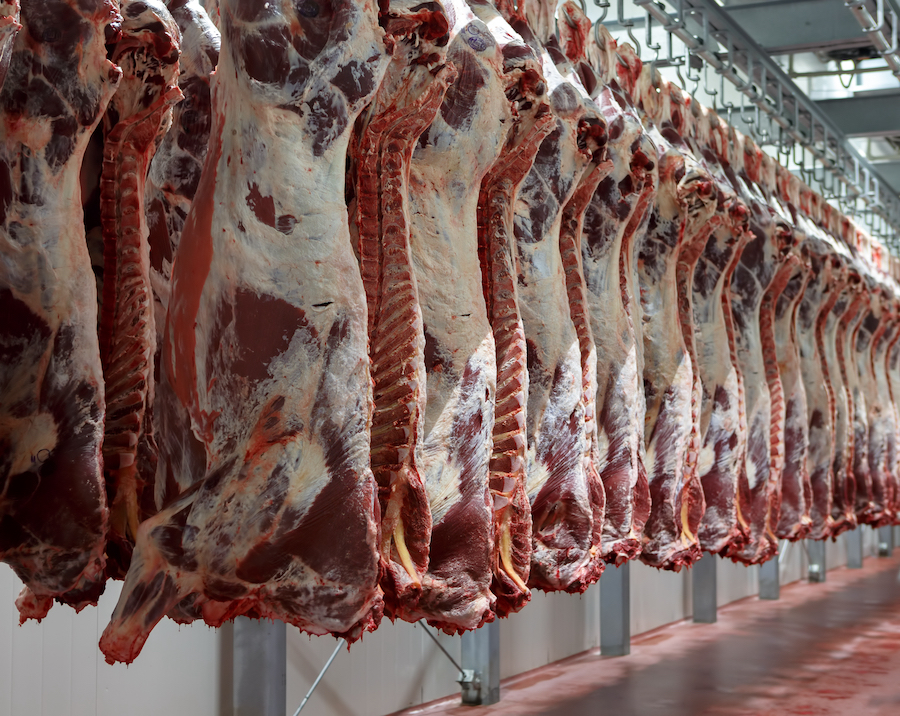Ministers keen for 5% rule for small abattoirs
5th January 2024
Speakers at this year’s Oxford Real Farming Conference emphasised the importance of small local abattoirs and concerns over ongoing closures – whilst Defra outlined new funding and progress.

This year’s ORFC included a session on local abattoirs organised by the Sustainable Food Trust. It featured positive announcements and progress, despite continuing closures in the sector.
Defra’s head of agricultural teams, John Powell, outlined the new Smaller Abattoir Fund which was launched last month. It will be open to eligible abattoirs to apply for grants to improve animal health and welfare, increase productivity, add value to products or contribute to new technology and innovation.
He urged eligible abattoirs to apply for the fund, as demonstrating the fund works and is successful will make a stronger case for making more money available to the sector in future.
The 5% rule
Government is also pulling together a case for adoption of the ‘5% rule’, and ministers are keen to see this happen quickly. The rule, which the Abattoir Sector Group has been lobbying for, is a flexibility that exists in EU legislation and enables smaller abattoirs to slaughter up to 5% of the total national throughput without triggering full veterinarian presence and charges.
Failure to adopt this rule has stifled productivity and growth in the sector as some of the smallest abattoirs opt to keep their throughput under the 1k livestock units per annum allowance in order to keep inspection and charges to a minimum.
Mr Powell said Defra wants to support the sector, saying: “You bring the problems to us and together we’ll look at what’s possible… We really are supportive of small abattoirs.”
Stephen Hill, owner of small abattoir and butchery Perry’s of Eccleshall, welcomed the new fund: “The funding has come at the right time for me; I want to move the business forwards.”
He called on existing small abattoirs to think about their future and emphasised the need for a succession plan. He said: “If you are a small abattoir owner and you are thinking of closing the abattoir then mothball it, don’t close it. We can’t afford to lose any more small abattoirs. Someone might come along who would want to take it over.”
Confidence to plan for the future
Anna Blumfield from Deersbrook Farm rears pasture fed Sussex cattle and runs a farm shop and butchery. She explained that their local abattoir was: “The key cog in our farming system – without them doing the processing I couldn’t get product to consumers.”
She outlined the many benefits of small local abattoirs, including their knowledge of good animal husbandry, personalised service and better end product, as well as providing jobs to the local community. She emphasised that “good communication and mutual trust” were essential as this allowed them to plan their business for the whole year: “Having knowledge that our abattoir is thriving gives us the confidence to plan for the future.”
Knock-on effects
Phil Scott from Lake District Farmers, is a wholesale meat supplier that provides a sustainable route to market for Fell farmers in Cumbria, through supplying customers at the other end of the scale – some of the world’s biggest companies with London-based offices who want to serve meat with a good story and environmental credentials.
Phil highlighted the challenges in the region – despite there being 5,242, mainly livestock-based, farm holdings in Cumbria with a 12,500 strong workforce, there are only two abattoirs offering private kill, both in the south of the county.
Following the closure of Black Brow abattoir in Wigton last year, farmers are now travelling from as far as Scotland down to Airey’s abattoir near Grange-Over-Sands to take their animals to slaughter, but this is having a knock on effect for local customers, with a local butcher’s shop unable to get their animals slaughtered in the run up to Christmas.
He emphasised the need for more skilled staff, both slaughter men and butchers, to ensure the sector thrives and called for more apprenticeships and better advertising of the sector as being a good career path to young people.
Breaking the mould
The final speaker, farmer Andy Gray, talked about Fir Farm’s Moveable Slaughter Unit, owned by Lady Parker, which he had been trialling on his farm in Devon.
He explained how the unit is the first of its kind in the UK and broke the mould with the Food Standards Agency, with whom they worked to ensure the unit met regulatory requirements. He said: “It has very much been a listening and collaborative experience, changing the environment in which we are working.”
It has inspired others to develop a second iteration of the unit and there are now potential plans for a small unit to be built on the Isles of Scilly, which currently lacks an abattoir.


